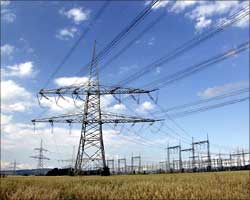 Traders of electricity in India have started surrendering licences, saying a four paise cap on their margin imposed by the electricity regulator in 2006 has made the trading business unviable. Also, at least two-thirds of the 40 licensed traders in the country, most of whom were issued licences in 2004, are yet to begin operations.
Traders of electricity in India have started surrendering licences, saying a four paise cap on their margin imposed by the electricity regulator in 2006 has made the trading business unviable. Also, at least two-thirds of the 40 licensed traders in the country, most of whom were issued licences in 2004, are yet to begin operations.
Two traders - Jindal Steel and Power Ltd and GMR Energy Ltd - have already surrendered their licences, and MMTC and Sarda Energy did so in the past two months. Another trader, Mahalaxmi Energy Trading, has recently applied to the regulator for a cancellation.
This could cause further shortages in availability for deficit-prone states like Uttar Pradesh and Bihar. Power trading was opened to private players in 2004 and these traders sell to state distribution utilities and industrial consumers.
"It is true that incidences of traders surrendering their licences to us have gone up in the recent past," confirmed a senior official from the Central Electricity Regulatory Commission, the power regulator in India, but added, "Why should we be worried? After all, none of the active traders has surrendered their licence."
Currently, only 12 companies out of the 40 licensed power trading entities in the country, are "actively" trading power, according the latest data obtained from the CERC.
The commission had limited the margin on inter-state trading of power to 4 paise per unit in January 2006 because several power traders were charging their customers margins as high as 9 to 10 paise a unit.
Traders, however, have demanded a relaxation in the margin, saying expenses have risen sharply since then.
The government had initially prescribed a cap of 5 paise on the margin of inter-state traders, before CERC was set up in 1998.
The price of power at that time was less than Rs 2 per unit; it is now over Rs 5 a unit.
Apart from the margin cap, an official from an active power trading companies hinted that smaller companies cannot cope with the business risks.
"The commission has increased the net worth requirement for licences to Rs 50 crore (Rs 500 million) but how can they expect a company with Rs 50 crore net worth to do business of Rs 50,000 crore (Rs 500 billion)? The companies are required to keep at least one month's trading volume as liquidity, which is not possible for smaller companies," he said.
In the new inter-state power trading norms announced earlier this year, the regulator had increased the minimum net worth requirement for a company applying for a power trading licence from Rs 1.5 crore (Rs 15 million) to Rs 5 crore. For the higher category of the licence, the net worth requirement was increased to Rs 50 crore from Rs 20 crore (Rs 200 million).
"A big trader also has to manage at least one month of trading volume. We have to buy power in advance and make payments to the supplier even if we don't get the payment from the buyer, taking all this risk on our books, so the low level of margin impacts our risk-taking capacity," the official from the trading company said.
Confirming its decision to quit trading in power, a senior official from state-run MMTC Ltd said, "We are not into this business anymore," but declined further comment.
G K Chhanghani, executive director of Chattisgarh-based Sarda Energy and Minerals Ltd, which surrendered its power trading licence in June this year, said that apart from the low margin cap, the company "realised that only some big companies can survive in power trading because it is a contact-based business".
A senior official from Hyderabad-based Mahalaxmi Energy Trading Private Limited, which has put in a request to the commission to revoke its licence, added, "The power trading business is not at all viable with the current level of margin cap."
The regulator is currently reviewing the margin cap, but will have to wait a Supreme Court decision on the issue. A case has been pending in the apex court since 2006, when the traders had challenged the commission's 4 paise margin cap regulation.
Industry analysts agree there is a case for reviewing the margin cap, but added that there is no cause for concern.
"As long as the larger players are not surrendering their licences, it should not be a concern. Though the cap on traders' margin appears to be low on a standalone basis, the markets have evolved their own structures through which the impact of low trading margin is mitigated," said Kuljit Singh, Head of Transaction Advisory Services, Ernst & Young.






